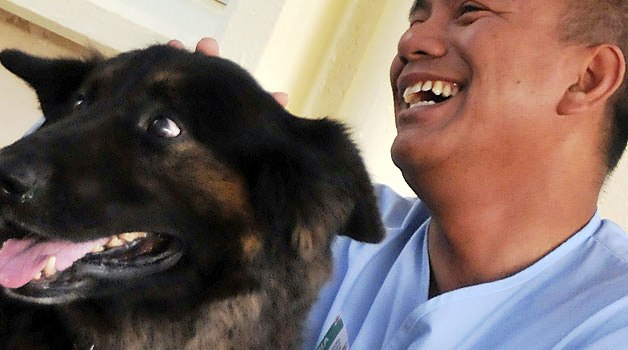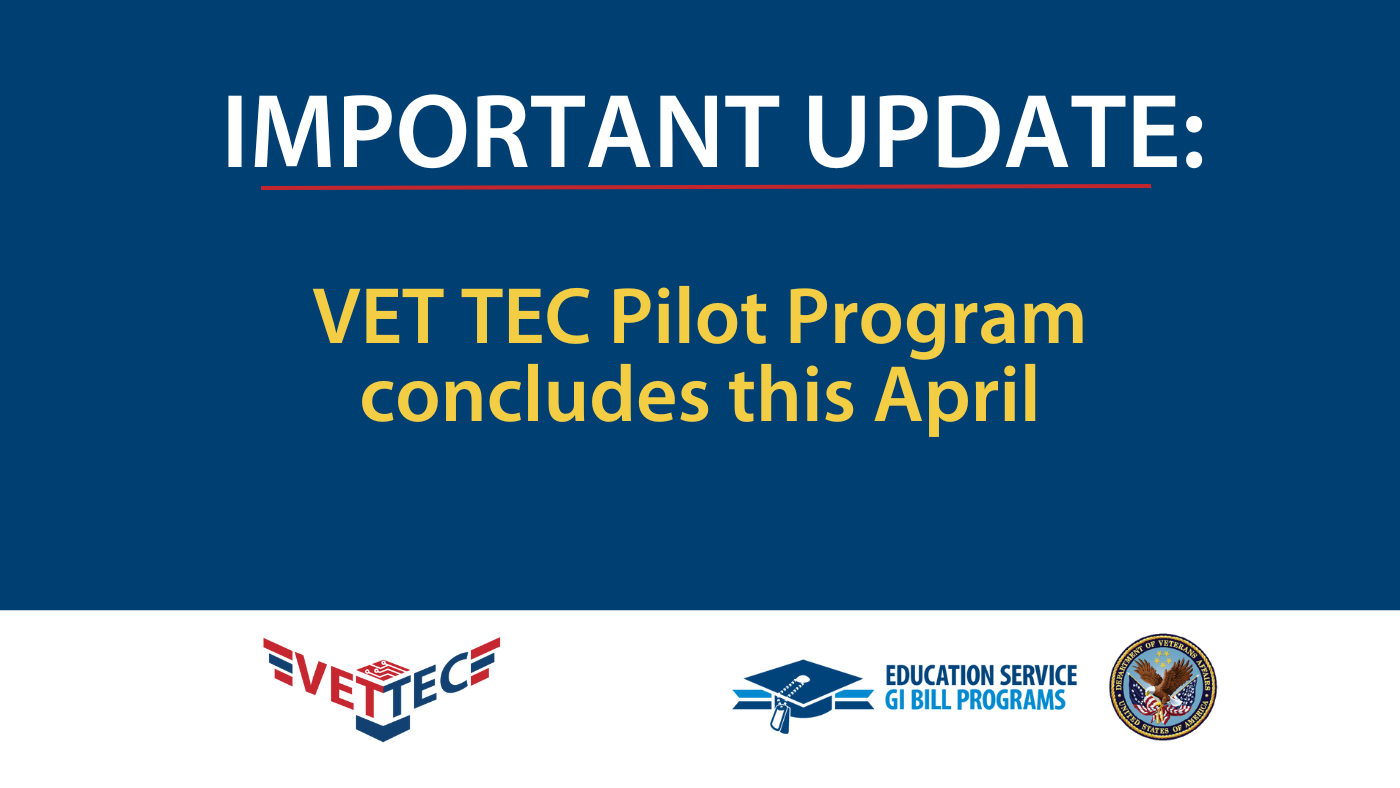The Department of Veterans Affairs is revising its regulation regarding the presence of animals on VA property.
Previous VA regulation authorized the presence of seeing-eye dogs on VA property and other animals at the discretion of a VA facility head. The updated regulation will ensure VA practices remain consistent with applicable federal law. It will also assist those entering and working at VA facilities in developing a clear and consistent understanding of the criteria governing facility access for service animals.
Under the updated regulation, service dogs are allowed on VA owned or leased property. Only dogs that are individually trained to do work or perform tasks for the benefit of an individual with a disability are considered service animals. There are no restrictions on the breeds of dogs that may be considered service animals.
All other animals will not be permitted in VA facilities, unless expressly allowed as an exception under regulations for activities such as animal-assisted therapy or for other reasons such as law enforcement purposes. Emotional support animals are not considered service animals under these regulations.
 Over the next thirty days, VA will provide training to frontline employees and ensure policies at all facilities are consistent with the new regulation. The revised regulation applies to all property owned or leased by VA, to include property under the Veterans Health Administration, Veterans Benefits Administration and National Cemetery Administration.
Over the next thirty days, VA will provide training to frontline employees and ensure policies at all facilities are consistent with the new regulation. The revised regulation applies to all property owned or leased by VA, to include property under the Veterans Health Administration, Veterans Benefits Administration and National Cemetery Administration.
With the regulation, there are a number of guidelines regarding service animals on VA property. For example, the animals are NOT permitted in areas where patient care, patient safety and infection control standards would be compromised by the presence of an animal, such as operating rooms or areas where medical equipment is sterilized or stored.
If a service animal is not under the control of its Veteran or an alternate handler, it will be denied access to or removed from VA property. This includes not being housebroken, or if the animal exhibits behavior or other signs that it poses a risk to the health or safety of individuals or other service animals while on VA property. Such signs may include biting, snapping, growling, baring its teeth, lunging or external signs of parasites or other external signs of disease or bad health.
VA understands the important role that service animals perform for Veterans and other visitors to VA facilities. This revised regulation will ensure that individuals entering VA facilities have a clear and consistent understanding of the criteria governing access of service animals.
The updated regulation is sure to raise a number of questions, including what VA considers as a service animal. Please see the most common questions below, and refer to our frequently asked questions for further guidance.
What are examples of work or tasks that a service animal is trained to do or perform?
A service animal is any dog that is individually trained to do work or perform tasks for the benefit of an individual with a disability, including a physical, sensory, psychiatric, intellectual, or other mental disability. The work or task that the dog has been trained to perform must be directly related to the person’s disability. Examples of such work or tasks include but are not limited to guiding people who are blind, alerting people who are deaf, alerting or protecting someone who is having a seizure, and calming a person with posttraumatic stress disorder (PTSD) during an anxiety attack.
I have an emotional support animal. Am I allowed to bring it to a VA facility?
No, the revised regulation requires that a service animal must be individually trained to do work or perform tasks for the benefit of a person with a disability. The provision of emotional support, well-being, comfort, or companionship does not constitute work or tasks.
Click here for more frequently asked questions about the new regulation.
Joyce Edmondson is a program analyst with the Veterans Health Administration.
Topics in this story
More Stories
Over the five-year program, more than 14,000 VET TEC beneficiaries completed their program and nearly half have reported finding meaningful employment with an average starting annual salary of $65,000.
VA is calling for applicants for the 2024 Specially Adapted Housing Assistive Technology grant.
Updated COVID vaccines are available free of charge to Veterans receiving care at VA .







I have a certified service dog named kandy who has given me comfort; warns me my impending anxiety outburst. I am no longer welcome in you facilities. You have just increased our stress level ten fold. I shall not go anywhere without Kandy, who by the way is more behaved than some humans…I shall never go anywhere without her, I see not the V.A. changing for the better.
Instead quickly becoming our nations hero’s our enemy. Fantastic change, Not thumbs down. I shall never see the inside of a V.A. facility again without her. The V.A. is responsible for the 23 veterans who die because of suicide everyday because of your damn rules.
Do not call me for a mental health concern, (sending the police to check on me) just leave me alone,.I truly believe the top V.A. executive officers are directly responsible for these 23 suicides a day. I tried my self to kill myself, last week. How can I trust you! Answer is; I can not. so I shall no longer see my primary care doctor, to receive my medication. You are now doing exactly what I desire, I shall die without my medication. (Suicide by my our countries own V.A. policies)
Ronald Roy Wallace
If the VA is making it mandatory that a dog must receive specialized training then the VA should pay for said training, to include travel and all additioal acrude expenses.
I have a 12 yr 8 mont old service dog. When should I expect the VA to buy me a replacement?
where can i finish my dog’s training so i can get proof that he is a service dog?
Check around for dog training schools. I’m getting some help reinforcing my dog’s training. Some non-profot orgs may even donate their time! Training & reinforcement are an ongoing process; that’s why it is very important to praise your dog when they do good, & remind them when they are not so good. Good luck!
The real question is are the va employee are trained?. Properly, thier in dog house in my book. I have a hilter nurse, I call cc doc, she tell me get this med, do this that, call me in 10 days, how is the doctors know????? I have too pay for med over the counter durgs,I CANT SEE MY DOCTOR, so doctor nurses in dog house thier being train by va to tell veteran we can’t cc uuu on ur time of sickness, but when 6 months check up comes the veterans have see the doc see if ur alive. I guess I can play thier game too.
I have an emotional support dog and need her some days to get out of the house. If I can’t bring her to the VA then I won’t go
You can thank your fellow veterans and visitors that come to the VA. More often than not people are bringing their pets to the clinics and hospitals like it is PETCO/PetSmart. These people have been abusing a law that was enacted under the ADA for people that really need a service animal. There had to be a way to stop the abuse. Multiple states are not enacting laws to prosecute people who claim they have a service dog, but really they do not. Be advised, that under VA rules, the animal that you claim is a service animal must be trained by an accredited school.
I have been doing a lot of work trying to get a service dog and during this process have learned a lot. I have learned a few pieces of information about the service dog trainers and organizations. There is no accreditation required for these organizations but there is specific training that the dog has to pass for him/her to be certified. Having said that I have seen and heard plenty of people getting fake “certification papers and vests causing those who have gone through proper channels get ripped for a few who have come before the with the family pet trying to fake it in
Let’s understand a key point. veterans have fulfilled their contracts to the government who’s supposed to fulfill their part of the contract. So with the VA trying to screw the vets over, its been long high time for veterans to get pissed off in unison
Service dogs are covered by a separate entity of the federal gov’t, the ADA, NOT the VA! This is out of the VA’s control. Christine is right, anyone can claim ANY animal is an Emotional Support Animal, & as I stated earlier, ALL animals can provide therapy to someone, but TRAINING a service dog can cost thousands of dollars. You can’t blame the VETERANS Administration for this one, brother vet.
I do not understand why a
Doctor that treats emotional illnesses, if he or she sees the need for an emotional supportive animal, for a veteran,k who has been in combat, and the Administrative Staff at the VA, because they do not like the idea, over ride the Doctor’s ruling, and obviously could care less about the Veteran Patient’s needs. How can you do this ? Someone from the Va PLEASE EXPLAIN THIS TO ME AND THE REST OF US. i AM NOT A PERSON WHO NEEDS AN ANIMAL, but I have plenty of brothers and sisters out there who do. It is a proven fact by several Brilliant Doctors, that this therapy works. Yet, it is funny the VA, Administrators can just ignore that. I am truly hoping I am misunderstanding something here.
Thank You for all you have done through the years. I love the VA, but some things are not right now. I know the biggest problem with the VA, is you are overworked and understaffed. That would clear up a lot of matters, wait times, more efficiency etc.
KW Hatley
If the doctor prescribes an esa then that is for home and airline access only. Esa are not trained. Service animals are. If you wish to bring fido into public, learn the laws and train the dog to mitigate your disability accordingly. I have a service dog and have been attacked numerous times because of untrained dogs. Read the ada laws, faq, and other guidelines.
Does this mean I cannot even leave my dog in the car with me when I go to the VA. He is an emotional support dog (as per the letter from my treating VA psychiatrist). I have never brougt him inside. However, I do take him most everywhere with me. The only exception is in the brief summer months (when I try not to go to the VA) when it would be too hot for him. So, does that mean, if in November I bring him we will be both thrown out of the facility?
Your emotional support dog does not have public access rights. You should not be taking him/her into non pet friendly places anyway.
To be totally honest, the DOG has no more rights than any other dog! It is MY constitutional right to be accompanied by my dog. People have claimed snakes, squirrels, all kinds animals as “service” animals; that is why the ADA had to differentiate service between therapy/emotional support, & service animals. We are lucky there are so many orgs (now) willing to help vets get service dogs! We could have used some help 40 or 60 years ago! I’ve had many 4-legged best friends, & I love my little girl very much, but she is TRAINED, just like we were, to know that when its time to go to work, you take care of business! She also knows that a job well done will result in some good ol’ R&R later!
Thank you, everyone; these conversations need to be brought out!
P.S. As an educational comment, I want o say that a Service Dog can also be designated a Therapy Animal, but being a Therapy or Emotional Support Animal (ESA) does not mean they are a service dog. By federal law, there are 2 animals that can be a service animal – a dog, & (believe it or not) a miniature horse.
Except the VA will not allow miniature horses.
THANK YOU !! Especially for noting that therapy & emotional support animals are not service dogs. Any animal can provide therapy, but service dogs are trained to provide a “service” ; they have a job to do! Unlike most service dogs, my lille girl is very social, & I don’t mind, because when I need her, she knows it, & immediately comes back to me. This reg is yet another example of what may seem like a small change to most, but to those of us that depend on our best friends to help us live normal lives, it is HUGE! ONE QUESTION: Gypsy Girl was “registered” thru the Mather, Ca, VA & I still carry copies of that paperwork, are there any plans for similar plans throughout the VA system?
Again, THANK YOU for protecting our constitutional rights!